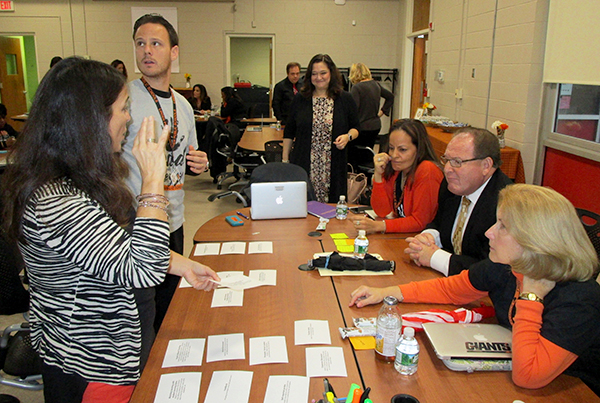Submitted by Gary Miller
Teachers and administrators from throughout Linden Public Schools gathered for professional development sessions on January 12, 2018, with visiting education consultant Stefani Hite.
Hite, a former teacher, and administrator, discussed studies by Australian researcher John Hattie, who seeks to quantify what classroom strategies work best to increase student performance.
“His philosophy is, ‘Know they impact,’” Hite told a group of administrators gathered at the district’s Professional Development Resource Center. “It’s fine that we show up in school every day and we work with kids, but in the end, we’ve got to know that what we’re doing is actually impacting the students in the way that we want it to.”
Hite met with the administrators in the morning, then with teachers who are members of the district’s Instructional Leadership Teams in the afternoon at School No. 1. The ILTs consist of about 100 teachers who receive professional development on data analysis and instructional strategies and pass the information on to the rest of the staff.
Reina Irizarry-Clark, an instructional coach for Linden, said Hite’s goal was to take Hattie’s research and show teachers how it translates into classroom technique, and to show administrators how to support teachers in implementing those strategies.
One key strategy she discussed was offering students specific feedback on how to improve their performance.
“So instead of saying, ‘Oh, good job,’ we tell the child what they need to work on,” Irizarry-Clark said. “It is about giving them specific guidance on the things they can do to increase their performance in the classroom.
“It’s one of those things that teachers have always done, but what the research suggests is that certain influences, such as feedback, have a higher impact on student achievement than others. We are learning what those influences are and how they translate into the classroom. It’s not like we need to reinvent the wheel.”
She said offering very specific feedback is good for student of all achievement levels.
“It doesn’t just benefit your struggling students,” Irizarry-Clark said. “It’s also beneficial for your higher-level students because you want to take them to the next level, you want to enrich them. You don’t want to just say they’re okay, they’re performing well. You want to provide them with the next steps, specific feedback in relation to the learning objective, to help that child achieve even more.”
In her morning session, Hite asked administrators to gather in small groups to rank what effect different classroom approaches would have on student learning.
“The important thing is not whether you get this right or wrong,” Hite told them. “The important thing is to have conversations about it.”
That fits in with what Irizarry-Clark said is a key to Linden’s Instructional Leadership Team approach.
“It’s not so much of a top-down approach, but it’s really a collaborative approach where everyone’s working together to say, ‘What are those things that we can do to make sure that we are achieving our mission?’” she said.
Hite’s sessions in Linden were made possible by the New Jersey Education Association, which has designated Linden as a model district in its Priority Schools Initiative. In exchange for Linden’s acting as a model to help other school districts boost their performance, the NJEA pays for additional professional development sessions for Linden’s educators.
Irizarry-Clark said sessions like Hite’s help rejuvenate Linden’s teachers.
“Sometimes you just have to take a step back to reassess what you’re doing,” she said. “You see you already do this in the classroom, but you say, ‘What else can I do with this technique?’”

(above, left to right) Antoinette Modrak, coordinator of special projects; William Mastriano, principal of School No. 6; Stefani Hite; Suzanne Olivero, vice principal of School No. 4; Anthony Cataline, principal of School No. 4; and Sandra Coglianese, principal of School No. 10.

